You are here
- Home
- Shattering a myth: What Were You Wearing Art Exhibit
-
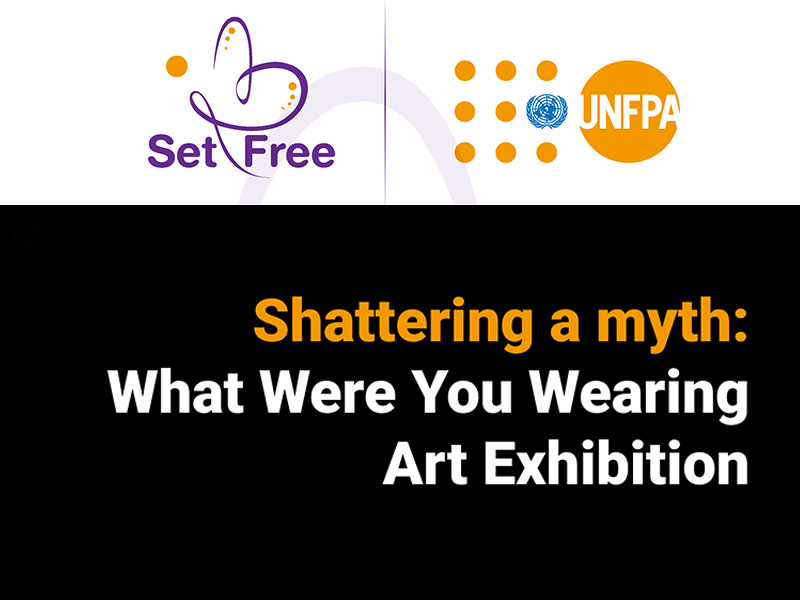
A school uniform. A pair of pajamas. Work slacks and a blouse. These are just some of the clothes that women and girls in Moldova were wearing when they were sexually assaulted, abused, or harassed.
As part of UNFPA Moldova's campaign Set Free: Untold Stories of Sexual Violence, this exhibit features ten stories of women and girls from Moldova, and a refugee fleeing from the war in neighboring Ukraine.
The survivors of rape and sexual assault shared their stories through symbolic representation of the clothes they wore during the attacks.
In Moldova, every second woman was a survivor of gender-based violence, and the sexual violence remains underreported because of stereotypes, stigma, and fear.
Collective victim-blaming myth is prevalent in Moldova and around the world, where survivors who have the courage to report are unjustly asked “What were you wearing?”
It is time to end the blaming and stand up for bodily autonomy, rights, and dignity of survivors of violence. Join the conversation.
-
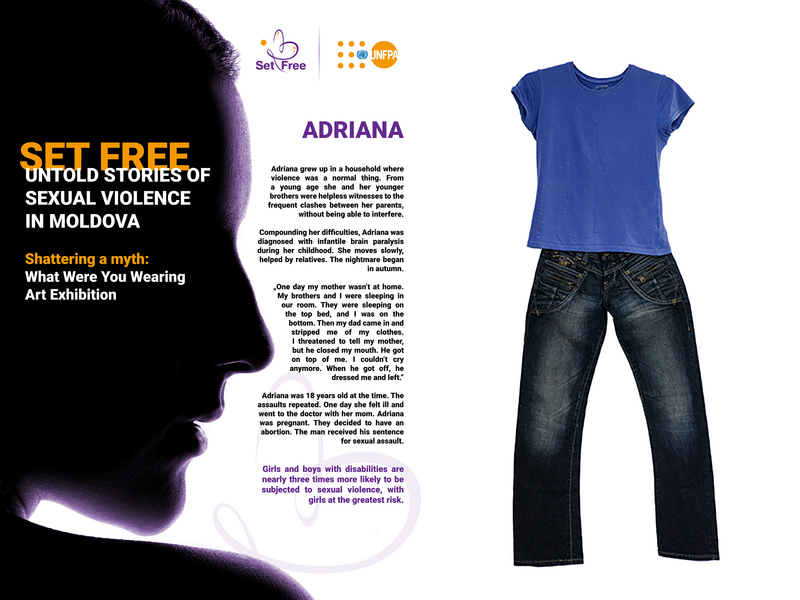
Adriana grew up in a household where violence was a normal thing. From a young age she and her younger brothers were helpless witnesses to the frequent clashes between her parents, without being able to interfere.
Compounding her difficulties, Adriana was diagnosed with infantile brain paralysis during her childhood. She moves slowly, helped by relatives. The nightmare began in autumn.
„One day my mother wasn’t at home. My brothers and I were sleeping in our room. They were sleeping on the top bed, and I was on the bottom. Then my dad came in and stripped me of my clothes. I threatened to tell my mother, but he closed my mouth. He got on top of me. I couldn’t cry anymore. When he got off, he dressed me and left.”
Adriana was 18 years old at the time. The assaults repeated. One day she felt ill and went to the doctor with her mom. Adriana was pregnant. They decided to have an abortion. The man received his sentence for sexual assault.
Girls and boys with disabilities are nearly three times more likely to be subjected to sexual violence, with girls at the greatest risk.
-
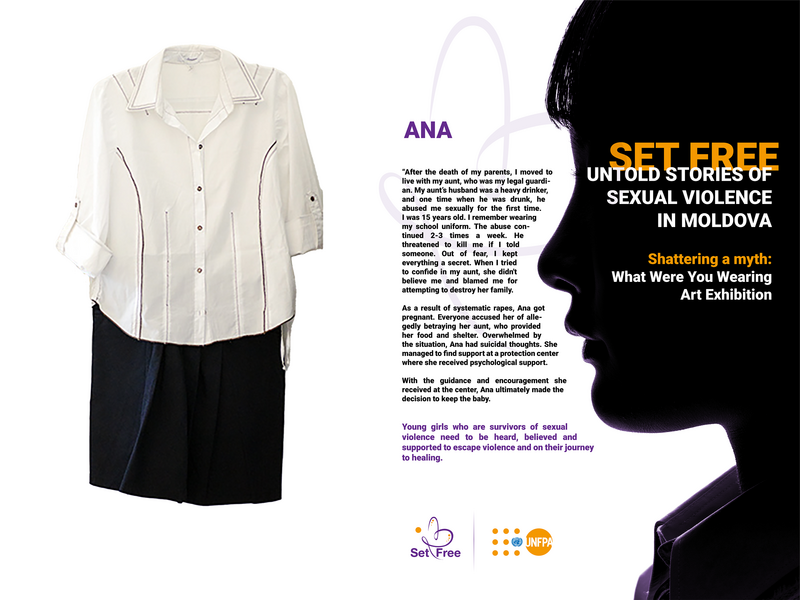
“After the death of my parents, I moved to live with my aunt, who was my legal guardian. My aunt’s husband was a heavy drinker, and one time when he was drunk, he abused me sexually for the first time. I was 15 years old. I remember wearing my school uniform. The abuse continued 2-3 times a week. He threatened to kill me if I told someone. Out of fear, I kept everything a secret. When I tried to confide in my aunt, she didn't believe me and blamed me for attempting to destroy her family.
As a result of systematic rapes, Ana got pregnant. Everyone accused her of allegedly betraying her aunt, who provided her food and shelter. Overwhelmed by the situation, Ana had suicidal thoughts. She managed to find support at a protection center where she received psychological support.
With the guidance and encouragement she received at the center, Ana ultimately made the decision to keep the baby.
Young girls who are survivors of sexual violence need to be heard, believed and supported to escape violence and on their journey to healing.
-
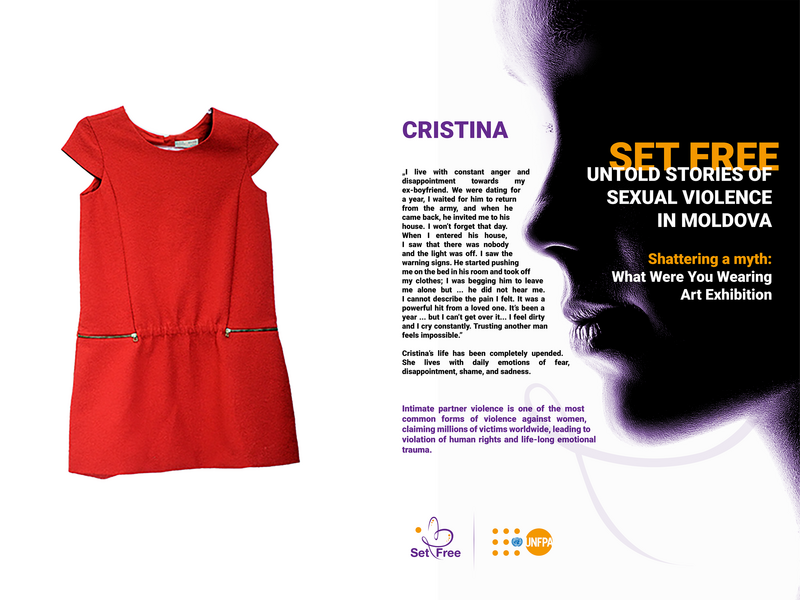
„I live with constant anger and disappointment towards my ex-boyfriend. We were dating for a year, I waited for him to return from the army, and when he came back, he invited me to his house. I won’t forget that day. When I entered his house, I saw that there was nobody and the light was off. I saw the warning signs. He started pushing me on the bed in his room and took off my clothes; I was begging him to leave me alone but ... he did not hear me. I cannot describe the pain I felt. It was a powerful hit from a loved one. It’s been a year ... but I can’t get over it... I feel dirty and I cry constantly. Trusting another man feels impossible.”
Cristina’s life has been completely upended. She lives with daily emotions of fear, disappointment, shame, and sadness.
Intimate partner violence is one of the most common forms of violence against women, claiming millions of victims worldwide, leading to violation of human rights and life-long emotional trauma.
-
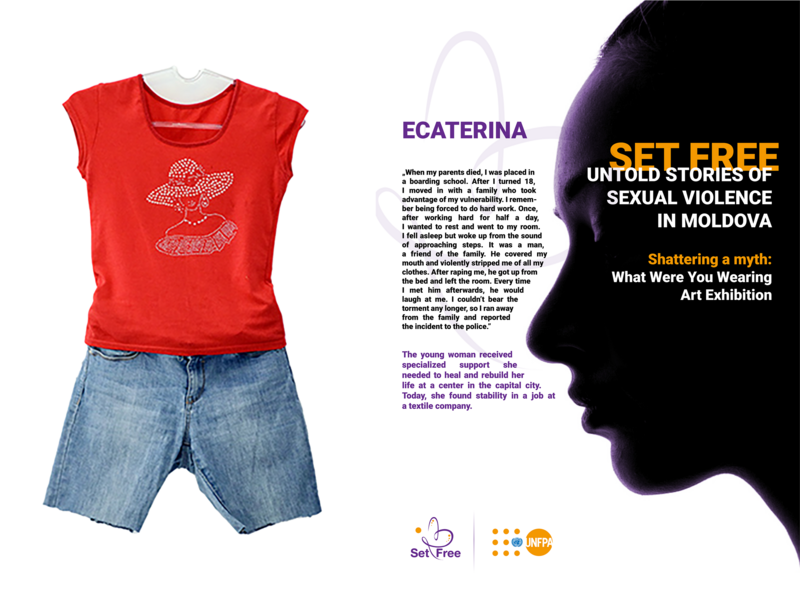
„When my parents died, I was placed in a boarding school. After I turned 18, I moved in with a family who took advantage of my vulnerability. I remember being forced to do hard work. Once, after working hard for half a day, I wanted to rest and went to my room. I fell asleep but woke up from the sound of approaching steps. It was a man, a friend of the family. He covered my mouth and violently stripped me of all my clothes. After raping me, he got up from the bed and left the room. Every time I met him afterwards, he would laugh at me. I couldn’t bear the torment any longer, so I ran away from the family and reported the incident to the police.”
The young woman received specialized support she needed to heal and rebuild her life at a center in the capital city. Today, she found stability in a job at a textile company.
-
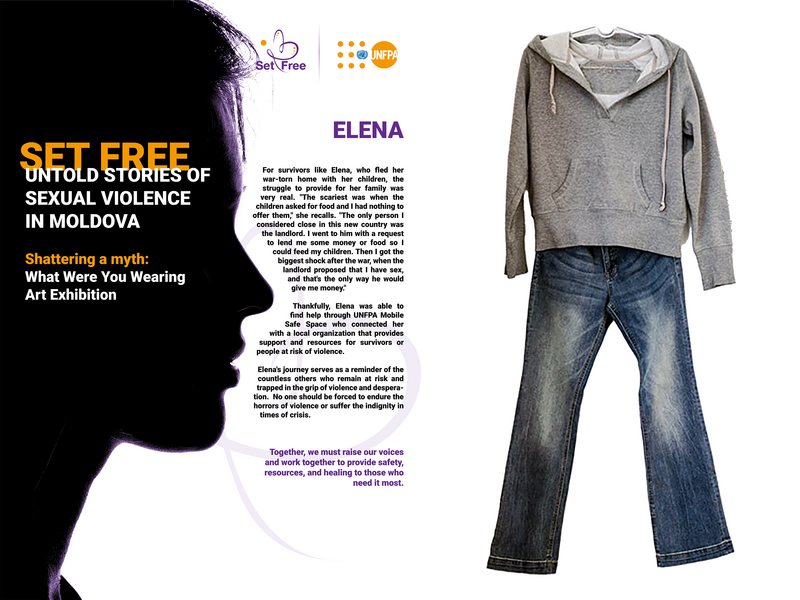
For survivors like Elena, who fled her war-torn home with her children, the struggle to provide for her family was very real. "The scariest was when the children asked for food and I had nothing to offer them," she recalls. "The only person I considered close enough to ask for help in this new country was the landlord. I went to him with a request to lend me some money or food so I could feed my children. Then I got the biggest shock after the war, when the landlord proposed that I have sex, and that's the only way he would give me money."
Thankfully, Elena was able to find help through UNFPA Mobile Safe Space who connected her with a local organization that provides support and resources for survivors or people at risk of violence.
Elena's journey serves as a reminder of the countless others who remain at risk and trapped in the grip of violence and desperation. No one should be forced to endure the horrors of violence or suffer the indignity in times of crisis.
Together, we must raise our voices and work together to provide safety, resources, and healing to those who need it most.
-
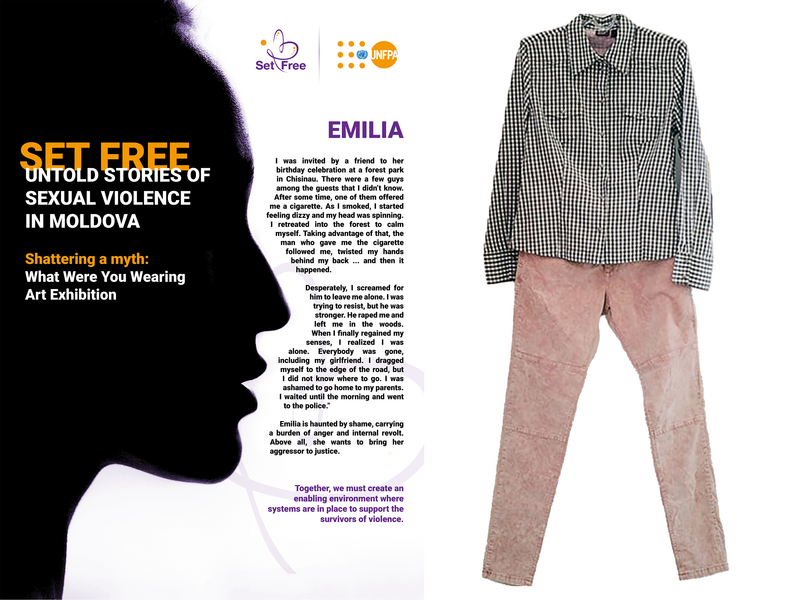
I was invited by a friend to her birthday celebration at a forest park in Chisinau. There were a few guys among the guests that I didn’t know. After some time, one of them offered me a cigarette. As I smoked, I started feeling dizzy and my head was spinning. I retreated into the forest to calm myself. Taking advantage of that, the man who gave me the cigarette followed me, twisted my hands behind my back ... and then it happened.
Desperately, I screamed for him to leave me alone. I was trying to resist, but he was stronger. He raped me and left me in the woods. When I finally regained my senses, I realized I was alone. Everybody was gone, including my girlfriend. I dragged myself to the edge of the road, but I did not know where to go. I was ashamed to go home to my parents. I waited until the morning and went to the police.”
Emilia is haunted by shame, carrying a burden of anger and internal revolt. Above all, she wants to bring her aggressor to justice.
Together, we must create an enabling environment where systems are in place to support the survivors of violence.
-
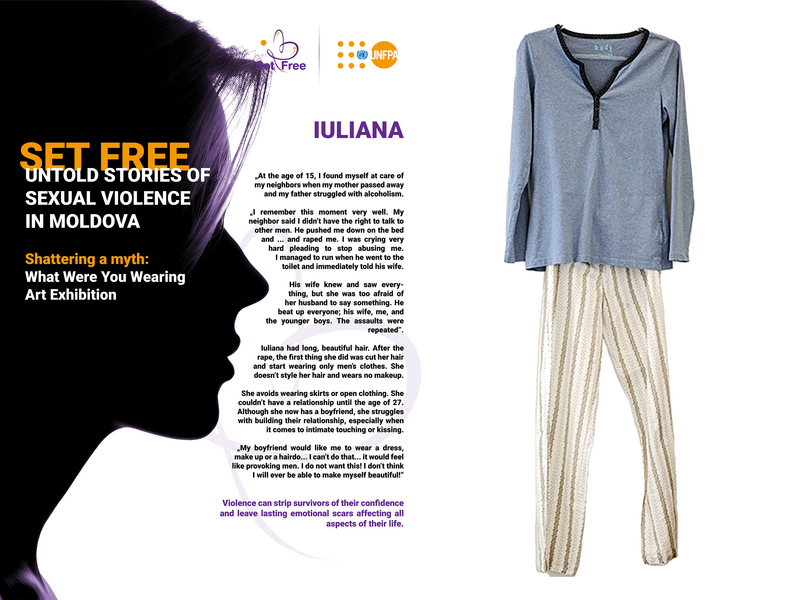
„At the age of 15, I found myself at care of my neighbors when my mother passed away and my father struggled with alcoholism.
„I remember this moment very well. My neighbor said I didn’t have the right to talk to other men. He pushed me down on the bed and ... and raped me. I was crying very hard pleading to stop abusing me. I managed to run when he went to the toilet and immediately told his wife.
His wife knew and saw everything, but she was too afraid of her husband to say something. He beat up everyone; his wife, me, and the younger boys. The assaults were repeated”.
Iuliana had long, beautiful hair. After the rape, the first thing she did was cut her hair and start wearing only men’s clothes. She doesn’t style her hair and wears no makeup.
She avoids wearing skirts or open clothing. She couldn’t have a relationship until the age of 27. Although she now has a boyfriend, she struggles with building their relationship, especially when it comes to intimate touching or kissing.
„My boyfriend would like me to wear a dress, make up or a hairdo... I can’t do that... it would feel like provoking men. I do not want this! I don’t think I will ever be able to make myself beautiful!”
Violence can strip survivors of their confidence and leave lasting emotional scars affecting all aspects of their life.
-
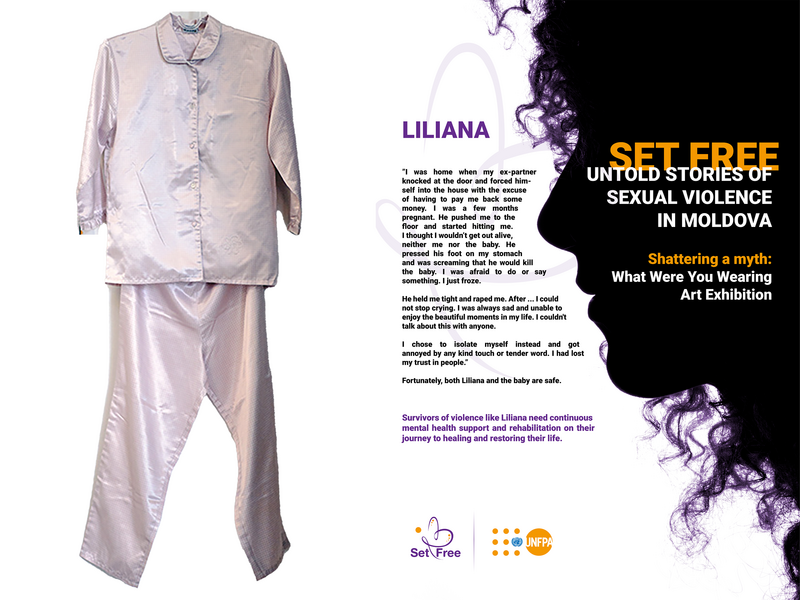
”I was home when my ex-partner knocked at the door and forced himself into the house with the excuse of having to pay me back some money. I was a few months pregnant. He pushed me to the floor and started hitting me. I thought I wouldn’t get out alive, neither me nor the baby. He pressed his foot on my stomach and was screaming that he would kill the baby. I was afraid to do or say something. I just froze.
He held me tight and raped me. After ... I could not stop crying. I was always sad and unable to enjoy the beautiful moments in my life. I couldn't talk about this with anyone.
I chose to isolate myself instead and got annoyed by any kind touch or tender word. I had lost my trust in people.”
Fortunately, both Liliana and the baby are safe.
Survivors of violence like Liliana need continuous mental health support and rehabilitation on their journey to healing and restoring their life.
-
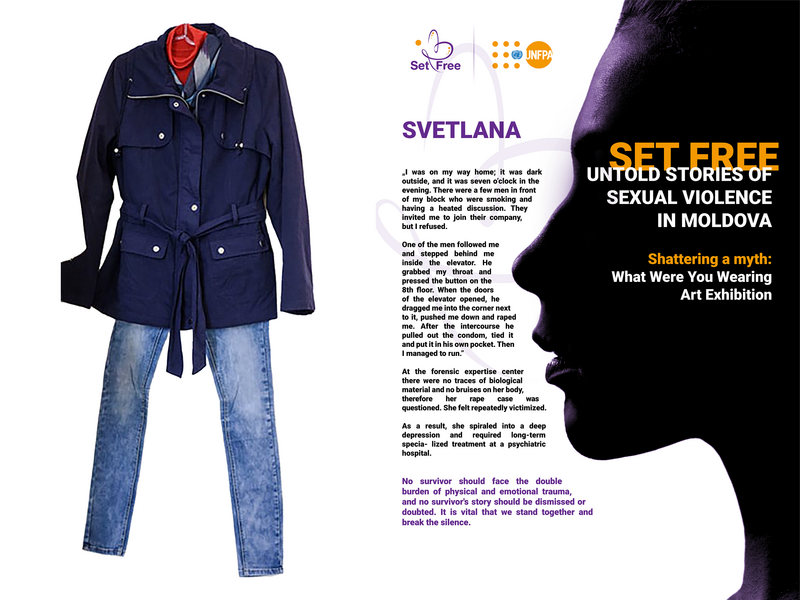
„I was on my way home; it was dark outside, and it was seven o’clock in the evening. There were a few men in front of my block who were smoking and having a heated discussion. They invited me to join their company, but I refused.
One of the men followed me and stepped behind me inside the elevator. He grabbed my throat and pressed the button on the 8th floor. When the doors of the elevator opened, he dragged me into the corner next to it, pushed me down and raped me. After the intercourse he pulled out the condom, tied it and put it in his own pocket. Then I managed to run.”
At the forensic expertise center there were no traces of biological material and no ecchymosis on her body, therefore her rape case was questioned. She felt repeatedly victimized.
As a result, she spiraled into a deep depression and required long-term specialized treatment at a psychiatric hospital.
No survivor should face the double burden of physical and emotional trauma, and no survivor's story should be dismissed or doubted. It is vital that we stand together and break the silence.
-
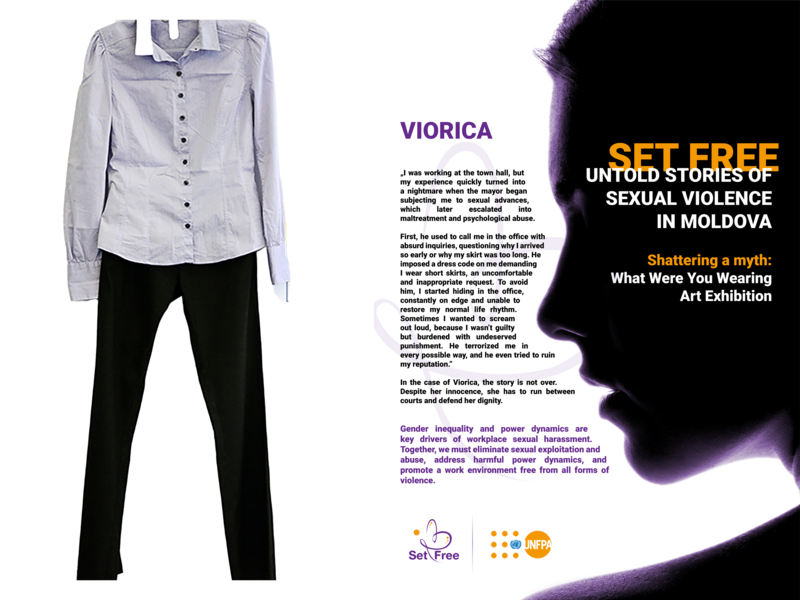
„I was working at the town hall, but my experience quickly turned into a nightmare when the mayor began subjecting me to sexual advances, which later escalated into maltreatment and psychological abuse.
First, he used to call me in the office with absurd inquiries, questioning why I arrived so early or why my skirt was too long. He imposed a dress code on me demanding I wear short skirts, an uncomfortable and inappropriate request. To avoid him, I started hiding in the office, constantly on edge and unable to restore my normal life rhythm. Sometimes I wanted to scream out loud, because I wasn’t guilty but burdened with undeserved punishment. He terrorized me in every possible way, and he even tried to ruin my reputation.”
In the case of Viorica, the story is not over. Despite her innocence, she has to run between courts and defend her dignity.
Gender inequality and power dynamics are key drivers of workplace sexual harassment. Together, we must eliminate sexual exploitation and abuse, address harmful power dynamics, and promote a work environment free from all forms of violence.